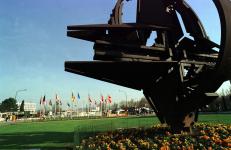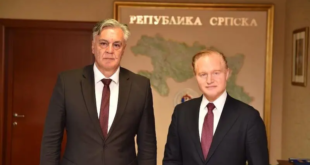 BiH
BiH
Some Bosnian Serb officials and media organs have expressed concern that hidden intelligence and military motives lurk behind NATO’s decision to hold a major exercise in Bosnia this September.
“There is no doubt that NATO is militarily and politically extremely powerful and that this Alliance carries out whatever it decides. But, at this moment, I don’t think there is conspiratorial thinking within NATO against [the Serb-dominated entity] Republika Srpska or Bosnia and Herzegovina,” local media quoted Petar Djokic, the Chairman of the Board for Security within the Republika Srpska National Assembly as saying.
The exercise, dubbed Joint Endeavor 2009, will be held from September 4-17 at the Kozara military barracks near Banja Luka, the seat of the Republika Srpska administration.
This is the first time that an annual NATO exercise has taken place in a non-NATO state. NATO has decided to hold the training programme in Bosnia to send the message that it strongly supports the country and its NATO membership process.
Djokic’s statement was an attempt to dispel public concerns, triggered by recent statements from some Bosnian Serb officials and media reports which speculated that NATO may have an additional, hidden agenda prompting the decision to hold the upcoming exercise near Banja Luka.
Some Serbian and Bosnian Serb officials said that NATO may use the exercise to detect, and perhaps even coopt, surveillance facilities in Republika Srpska. Other reports speculated that NATO may use the exercise to pinpoint weapons and ammunition depots, or that it is intended to raise political pressure on Republika Srpska leaders and Belgrade.
Previously, some officials and media reports speculated that the NATO exercise may even be used to arrest and unseat Republika Srpska Premier Milorad Dodik.
The speculation and expressions of concern reflect lingering tensions in Bosnia and Herzegovina, which, over the last three years, has faced its most debilitating political crisis since the end of the 1992-95 war.
Some local and international officials place most of the blame for the crisis on the Republika Srpska leadership and Dodik, who has repeatedly threatened that Republika Srpska’s could make moves towards independence.
“This exercise has […] implications for regional relations and Bosnia and Herzegovina itself. But I don’t think this should be viewed in this way,” Djokic told reporters. He added that, through NATO, Bosnia “is made even safer”.
Bosnia joined NATO’s Partnership for Peace programme in December 2006 and is currently developing an Individual Partnership Action Plan to further promote cooperation with the Alliance. In April 2008, Bosnia was invited to begin an Intensified Dialogue with NATO on its membership aspirations and related reforms.
 Eurasia Press & News
Eurasia Press & News



